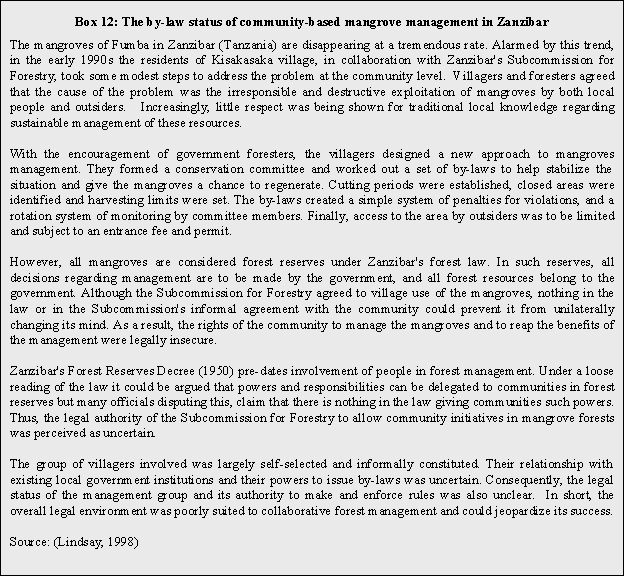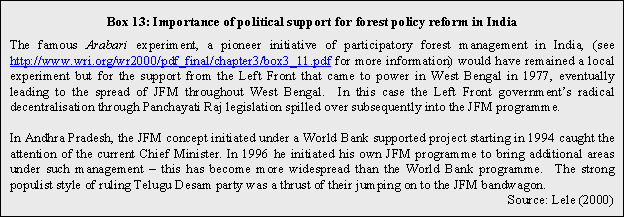


The aim of this analysis of collective FMP and plan is to promote appropriate changes in forest policies and legislation which will support the effective scaling up of local forest governance. This chapter tries to give a brief overview of some of the actual policy and legislative changes needed and how to achieve them.
Many decentralized local forest governance systems are based on use of local by-laws. Whilst by-laws may appear to offer legal backing to these arrangements, there are some risks involved as exemplified by the case study from Zanzibar (Box 12) by Lindsay, (1998). Collective forest managers do not necessarily have long-term legal security under by-laws because the legal authority of the local institution granting self-governance authority may itself be uncertain. This may cause problems relating to power relationships with other stakeholders outside the community (e.g. with timber concessionaires, neighbouring villages, nomads, local government) because by-laws cannot formally define the rules by which CFMs can interact with outsiders nor can locally derived rules define the limits of state power. The rights of CFMs to manage and utilize forests need to be exclusive to prevent access by outsiders. Clarity is needed as to what these rights actually are92 and that they cannot be taken away or changed unilaterally. The example from Zanzibar illustrates the fragile legal security of many CFMs.
Many community forestry initiatives have used the local by-law option as a means of operating within the local political context. This is often a positive choice to work with imperfect legal instruments and concentrate on persuasion and building alliances rather than pushing immediately for major legal changes that may upset delicate coalitions
In India, the JFM programme continues to be mostly a creation of state notifications and administrative orders93. The national Forest Act of 1927 has not been revised, and there are almost no examples of revised State Forest Acts to provide a firmer legal basis for JFM (Lele, 2000). This has provided some initial flexibility in responding to experiences and problems encountered in implementation but it also fosters a sense that the rights of participants are malleable and temporary, and can be changed unilaterally government decides that conditions warrant it (Kant and Cooke, 1998 cited in Lindsay, 1998).

The use of simpler FMPs for more effective local forest management implies more devolved decision making since it is the local CFMs who will be ultimately responsible for preparing and implementing such plans. However, devolved forest management is not a politically neutral strategy. In most places it requires an agenda of political reforms to support it.

Devolved natural resource management has been particularly problematic where the sector is a net contributor to the state budget94. This true for the forestry sector in many countries where forest revenues fund other sectors of government. Therefore, scaling up of small-scale initiatives in participatory forest management and their legitimization by the state does not normally take place without political backing. Box 13 gives two examples from India of this.
There is now a general trend for top-down governance and resource management to be consciously replaced by more participatory and devolved approaches across all sectors – usually because the state is convinced of the economic, social and environmental benefits of these approaches (Lele, 2000). However, as Lindayati (2000) points out, policy formulation is not necessarily about a rational decision-making process and selecting the best (economically, socially and ecologically) policy options. For example, policy decisions are often determined by the interests and ideals of those who have power to make them. Some are a direct response to natural calamities or disasters95 whilst some are strongly influenced by the political mood in a society96. Often a “sense of crisis” is needed to “unfreeze” policy makers and introduce changes (Bass et al, 1998).
As shown by this study, there are many examples of simpler forest management planning from many countries. The extent to which successful initiatives can provide a stimulus for effective policy change leading to a greater spread of benefits depends on a number of factors identified by Mayers and Bass (1999):
• extent of ‘gap’ left by government;
• viability of local forestry options;
• viability of local institutions;
• strength and equity of incentives, leaders and organization at local level;
• degree and equity of devolution of power; and
• degree of support from enlightened national/state elite.
Collective forest managers therefore need the opportunity, within policy frameworks, to experiment with such new ideas. Foresters can assist in the facilitation process by linking successful field-based initiatives with supportive policy changes.
The supportive role of forest administrations is important for initiatives such as learning–oriented FMP preparation processes. It is common for frontline staff of such institutions to be overloaded with ever expanding service delivery for collective forest management approaches in addition to their other duties and their own subsistence needs.
Under conventional extension approaches, frontline staff are usually expected to be carriers of predetermined technical information and normally do not need to be highly qualified professionals with a range of skills. However, as has been described here, participatory planning processes require support and facilitation – invariably is the frontline staff who are expected to provide this despite the fact that they are frequently underpaid, de-skilled, poorly motivated and provided with little or no infrastructural support.
Shepherd (1998) argues that such frontline staff, standing at the extension-client interface, have to act as liaison persons, spokespersons, disseminators, resource handlers and negotiators between the forestry administration and collective forest managers. This is a complex job requiring ability, commitment and confidence.
Policy and legislative change in support of collective forest management (with all the implications of simpler FMPs), therefore needs to be backed up by organizational changes within forestry administrations which recognize the critical role being performed by frontline staff. Often this means rebuilding the organizational structure itself based on the new task requirements and, perhaps not surprisingly, decentralizing and devolving powers and responsibility within such government institutions.
Local elites including large landholders, traders, traditional leaders, and other individuals who have had power to influence many of their neighbours in matters of forest management are often in the position of informal policy makers shaping the outcome of devolution policies – usually against the interests of the poor, (Edmunds and Wollenberg, 2001). Frontline forest administration staff are expected to facilitate the sensitive process of realigning these local power arrangements as part of the decentralized forest management planning process – clearly not an easy job.
Local bureaucrats may be reluctant to challenge the position and interests of local elites because of historical “patron-client” relations between these groups (Malla, 2001). In this situation, the local representation process can be easily manipulated with participation of the forest-dependent poor in planning and decision-making being especially difficult and often an ideal rather than a prevailing practice. Ironically, the organization (forest administration) which has been given the responsibility for devolving control of forests to local communities has traditionally represented the interests of those same elites (Gilmour and Fisher, 1991). One solution would be to improve the levels of skills and professionalism amongst frontline staff (see section 5.3) although some would argue that as this is never likely to be really effective a better model would be for other organizations (NGOs) or other service providers to become more involved – particularly with negotiation between local elites and other local people.
92 Lindsay (1998) introduces striking examples of laws that state that “customary rights of forest-dwellers will be respected as much as possible” or “customary law shall be respected unless the national interest requires otherwise”. He claims this is partly because it may suit some people in power for rights to be vaguely defined.
93 For example, in February 2000, the government of India approved a new set of JFM Guidelines (as the JFM Circular and Notification of the Ministry of Environment and Forest – not through the amendment of the Forestry Act of (1927). Though the policy has been approved at the national level, it requires careful facilitation at the state, divisional, and local levels to ensure that it is rapidly and systematically implemented (Poffenberger, 2000).
94 Lele (2000) points out that devolution of authority in common resource management is more popular in the irrigation sector because it is a heavy drain on the state budget, contrary to the forest sector. Irrigation departments deliver a single service with significant operation and maintenance costs and form an easy target for criticism when the returns are not even enough to cover these costs hence the political popularity of joint irrigation management in India.
95 The 1998 logging ban in China after Yangtze River flood and 1989 national logging ban in Thailand after disastrous floods and land slides are examples.
96 Lindayati (2000) argues that changing political-economic structures (i.e. from dictatorship to democracy) opens up more opportunities to pursue progressive community forestry policy. For example, in the Philippines, the Leyte Island’s devastating 1991 floods helped to reduce government support for commercial logging and provided a more favourable political climate for community forestry under progressive Aquino regime. A similar phenomenon such as disastrous 1982 forest fires took place in Indonesia, although the direction of policy change has not been in favour of forest-dependent communities but led to tighter government control over local forestry practices under Soeharto regime. The underlying thrust of the latter regime was rather to drive local communities away from forests by providing them alternative livelihood sources). CBFM implementation in Indonesia has been greatly speeded up in the social movement of reformasi after the fall of Soeharto regime in 1998 (See Poffenberger, 2000).